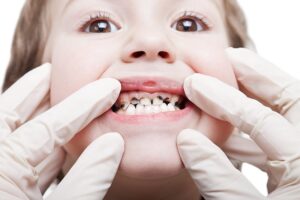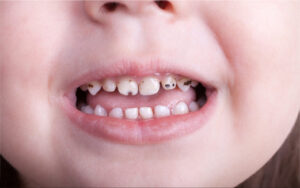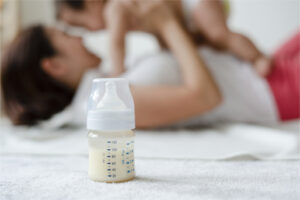How to Prevent Baby Bottle Syndrome
September 13th, 2019
What is "Baby bottle syndrome?"
Baby bottle syndrome, now known as Early childhood caries ( ECC ),
is defined as the presence of 1 or more decayed teeth or missing teeth
This results in dental caries or (cavities) or filled tooth surfaces in
any primary tooth between birth and 71 months of age.

Below we will explore how to prevent baby bottle syndrome.
1. Giving them unlimited access to beverages overnight can harm their oral health.
Let's explore some reasons why and what we can do.

Issues associated with a bottle overnight:
- The nipple of a bottle prevents saliva from washing away the sugars from the incisors.
bottom front teeth may also be affected
- Milk, juice, and formula all contain simple carbohydrates. Bacterias just love sugars and cause plaque.
- As the bacteria break down fluids, it produces acids that may harm baby's tooth enamel.

What can we do?:
- A bottle or a sippy cup with water overnight is better than milk or juice.
however, babies should breastfeed or drink for the first 6 months before giving them more water.
The formula itself should not be too diluted with water. Giving babies too much water can affect appetite.
- If your child falls asleep while feeding, remove the bottle as soon as you notice your baby is no longer sucking.
- Teach your child to drink from a cup rather than a bottle by about six months. Children should be weaned from the bottle by about one-year-old.
- Changing a child's diet may help prevent baby bottle tooth decay. More about this below.

2. Keep them Hydrated during the day
Adequate hydration is essential for growing babies. They are more prone to dehydration than adults are.
Here are some signs of dehydration to watch out for:
Sleepiness.
Irritability.
Thirst.
Less elasticity in the skin.
Eyes and fontanel (or soft spot on the head) appear sunken.
Decrease or absence of tears.
Dry mouth.
more than 6 hours without a wet diaper.
Decrease the number of wet diapers.
urine looks or smells stronger.
rapid breathing
High heart rate
3. Changing a child's diet may help prevent baby bottle tooth decay.
Employing the following changes can help:
a. Gradually dilute the bottle contents with water over a period of two to three weeks.
b. Once that period is over, if you give a child a bottle, fill it with water or give the child a clean pacifier recommended by a dentist. The only safe liquid to put in a bottle to prevent baby bottle tooth decay is water.
c. Decrease consumption of sugar, especially between meals.
d. Children should be weaned from the bottle as soon as they can drink from a cup, but the bottle should not be taken away too soon, since the sucking motion aids in the development of facial muscles, as well as the tongue.

4. Clean their teeth
Cleaning baby's teeth can begin as soon as the first tooth pokes through the gums.
however, even though the teeth have not fully come out, doctors recommend brushing the gums to rid particles and bacteria. Use a clean, damp washcloth, gauze pad or a finger brush to gently wipe clean the first teeth and front of the tongue. Massage the gums and gingival tissues\
once a day until they turn 12 months old.
As for the toothbrush, it should be soft and have no more than three rows of bristles.
A pea-sized amount of toothpaste should be applied. Toss out any toothbrushes that have become rough or after using 2-4 months. This is because nasty mouth bacteria can begin to build up.
For babys toothbrushing time:
* Nice and gentle
* Sing a song for distraction
* Let baby examine the toothbrush a little bit.
* Colorful silicone finger brushes with nubs are a great way to move to the next level
from a washcloth and then to a brush.
When baby is ready to brush on their own, they will start grabbing for the brush.
5. Bring your baby to their first dental visit after the first tooth erupts. (Typically before age one)
Your baby needs to be healthy, be able to chew and speak, have strong teeth, and a strong jaw.
Medical and Dental professionals recommend that baby's first visit should be
within 6 months of the first tooth coming in (erupting), or by about 12 months at the latest.

This article is intended to provide an understanding and knowledge about baby bottle syndrome and babies' dental health. Always seek the advice of a professional dentist
with any questions, you may have regarding your child and medical conditions or treatments.



















